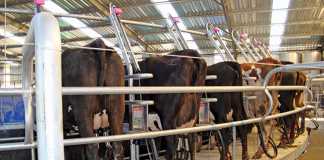The full effect of recent labour unrest in the agricultural sector in the Western Cape will only become clear at the end of the current harvest season, when farmers can take stock of product losses. Table grape farmers in De Doorns, the town where violent protest action first erupted in November last year, bore the brunt of the strikes with about 30ha of vineyards burnt down, roads damaged and farm infrastructure destroyed.
According to Michael Laubser, chairperson of the Hex Valley Table Grape Association representing table grape farmers in De Doorns, most farmers had resumed harvesting and packing grapes at 100% capacity. He said the greatest loss had probably been a breakdown of trust between farmers and farm workers.
“Because of the strikes, we packed about 40% slower than usual during the first few weeks of the harvest season. Luckily this has been a late season, so until now there have been no large-scale product losses. “Weather conditions during the remainder of the season will determine whether farmers will suffer further damage. In some cases, grapes have been harvested and packed at a riper stage than usual which could affect their quality and shelf life,” he said.
Laubser said there was no way to gauge the full impact of the strikes at this time, but that table grape exporters were worried about the uncertainty which labour unrest created among international buyers.
Exports
“Our buyers, in the UK and elsewhere, know that our house is in order in terms of the ethical treatment of farm workers because farmers are compliant with a host of ethical audits, including the ethical treatment of farm workers, required by the supermarkets, before they qualify to export their products. This is not really the point of concern; what worries them is the security of supply,” he said.
According to Laubser, table grape exporters could not afford for buyers to get nervous about SA’s security of supply as this would open the door for competitors to take market share. “No contracts have been cancelled, so at the moment exports have not been affected, but our buyers are asking questions and it is clear they have concerns about whether or not South African farmers will continue to be able to honour supply agreements,” he said.
Bad Press
The industry was also tense about the effect that international media reports, especially in the UK, portraying SA’s fruit and wine industries in a negative light, would have on consumers in those countries. The wine industry was upset about a recent article that appeared in UK newspaper, The Guardian under the headline: “Don’t buy South African wines: striking workers’ plea to foreign consumers”.
The article repeated a call by Nosey Pieterse, secretary general of the black agricultural sector union, Bawusa, for foreign buyers to pledge not to import South African products unless their call for a pay rise from R69 to R150 a day was met. It also ran a poll asking “Will you boycott South African wine?” in which 59% of people said they would.
Responding to the poll and the article, Wines of South Africa (Wosa) chief executive Su Birch wrote an open letter to the publication stating that the coverage unfairly targeted the wine sector and had “the potential to do unimaginable damage to an industry that is working hard, through its support of the Wine and Agricultural Industry Ethical Association (Wieta) and Fairtrade, to ensure the ethical treatment of workers”.
In the letter Birch said the call to boycott South African wines was “inappropriate and saddening”. “The wine industry contributes an estimated R27 billion to the South African economy and directly employs about 275 000 people. These people will be negatively affected if sales fall – a very likely outcome if consumers boycott our wines when wine farms are already battling tough market conditions,” she said.
Birch asked consumers to support the industry and farm workers by buying South African wines, ensuring efforts by Wieta, Fairtrade, Fair for Life and all their producers could continue.












